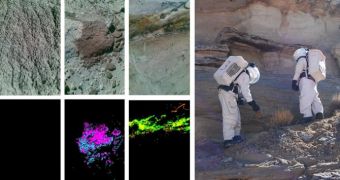One of the things about space exploration, and exploring other planets directly is that everything needs to function as efficiently as possible. That is to say, since we don't have yet the technology to go to Mars on a daily basis, any trip we make would need to be self-sufficient, and also able to carry as many pieces of scientific equipment as possible. One innovation that could remarkably ease the astronauts' tasks would be combining Artificial Intelligence with their spacesuits, which would essentially turn them into cyborg biologists, Wired reports.
University of Chicago geoscientist Patrick McGuire has recently developed a series of mathematical algorithms that are capable, within the confines of a spacesuit, to analyze and detect signs of life in a barren landscape. “When they look at scenery, children gravitate towards the thing that’s different from the other things. That’s how I looked at the cyborg astrobiologist,” he says. In his vision, future spacesuits would also include artificial eyes, in addition to the ability to decide which things are the most interesting, and drawing its human operator's attention to them via a heads-up display (HUD).
A special type of Hopfield neural network is the skeleton of McGuire's costume. The algorithm is capable of comparing incoming flows of data to patterns it has already seen, which allows it to properly identify all differences, as well as new and different things. In a test trial in the field, the system proved effective at differentiating barren rocks from lichens, which sets the basis for its future development into a system able to differentiate, for example, two species of lichens between them. Details of the test-run and the AI network's basic principles were published on Thursday in the journal arXiv.
“You would have a very complex artificial intelligence system, with access to different remote sensing databases, to field work that’s been done before in the area, and it would have the ability to reason about these in human-like ways,” McGuire says. “Then you’d have a robotic astrobiologist, and the humans would be back here on Earth, in Mission Control. The algorithms help us out, but humans are ultimately responsible,” he concludes.

 14 DAY TRIAL //
14 DAY TRIAL //